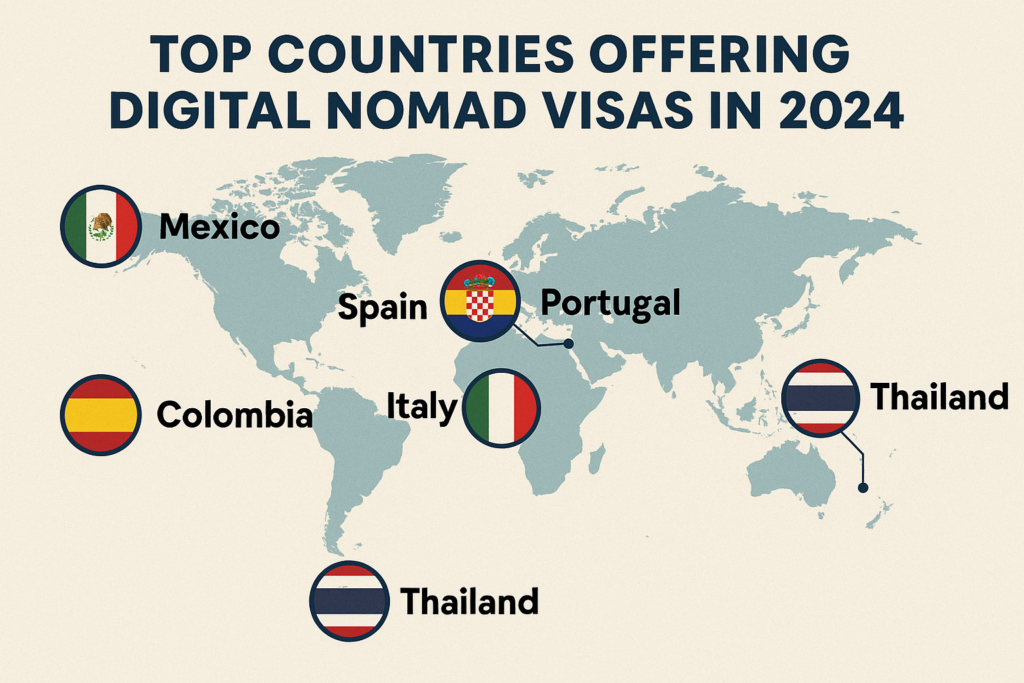📍 Dreaming of a sun-soaked beach as your office or a cozy café in a historic European city as your workspace? The digital nomad lifestyle is no longer just a dream – it’s becoming increasingly accessible, thanks to countries around the world rolling out the red carpet for remote workers.
As we step into 2024, the landscape of digital nomad visas is more exciting than ever. From the cobblestone streets of Portugal to the pristine beaches of Bali, governments are recognizing the value that location-independent professionals bring to their economies. But with so many options, how do you choose the perfect destination for your nomadic journey? 🌎💼
In this comprehensive guide, we’ll explore the top countries offering digital nomad visas in 2024, delving into everything from European hotspots to Caribbean paradises and emerging Asian tech hubs. We’ll break down visa requirements, compare benefits, and provide insider tips to help you make an informed decision. Whether you’re a seasoned nomad or just starting to consider the leap, buckle up as we embark on a global tour of the most enticing digital nomad destinations!
Understanding Digital Nomad Visas
![]()
Definition and benefits
Digital nomad visas are specialized permits that allow remote workers to legally live and work in a foreign country for an extended period. These visas offer numerous benefits:
- Legal residence status
- Ability to work remotely for foreign companies
- Access to local amenities and services
- Opportunity to immerse in new cultures
- Potential tax advantages
Rise in popularity
The demand for digital nomad visas has skyrocketed in recent years:
| Year | Number of countries offering digital nomad visas |
|---|---|
| 2019 | 7 |
| 2021 | 25 |
| 2023 | 50+ |
Factors contributing to this growth include:
- Increased remote work adoption
- Technological advancements
- Desire for work-life balance
- Countries seeking to boost tourism and local economies
Key features of digital nomad visas
Digital nomad visas typically share several common characteristics:
- Longer duration (usually 6-24 months)
- Proof of remote employment or stable income
- Health insurance requirements
- Minimum income thresholds
- Simplified application processes
These visas often offer more flexibility than traditional work visas, catering specifically to the needs of location-independent professionals. As we explore the top countries offering these visas, you’ll see how each destination tailors its program to attract digital nomads while balancing local economic interests.
Top European Countries for Digital Nomads
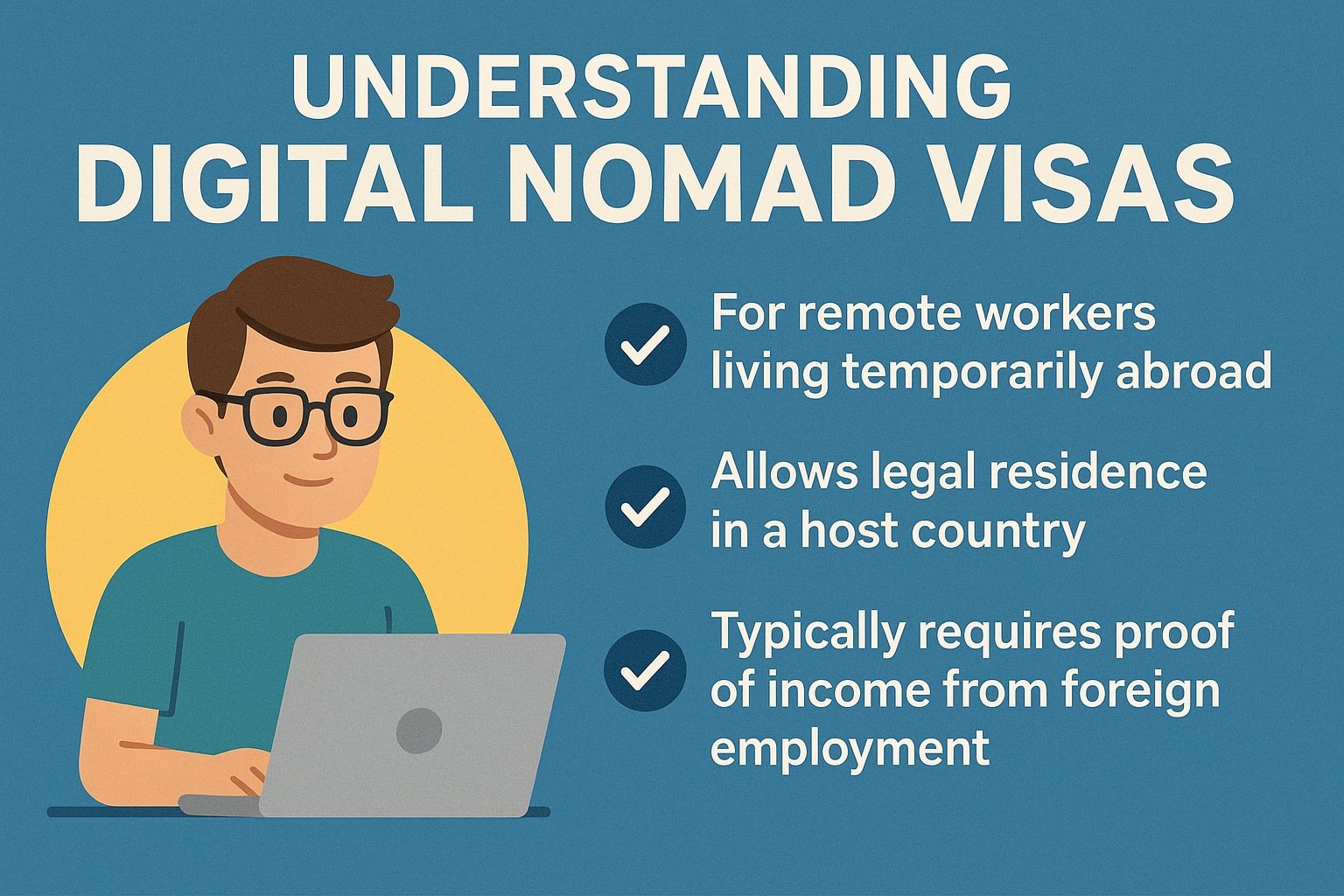
A. Portugal’s D7 Visa
Portugal’s D7 Visa, also known as the Passive Income Visa, has become increasingly popular among digital nomads. This visa allows remote workers to live and work in Portugal for up to two years, with the possibility of renewal.
Key features of the D7 Visa include:
- Proof of passive income (e.g., investments, rental income, or remote work)
- Access to Portugal’s high-quality healthcare system
- Potential path to permanent residency and citizenship
- No minimum stay requirements
| Requirement | Details |
|---|---|
| Income | Minimum €705 per month |
| Application Fee | €83 |
| Processing Time | 3-4 months |
| Validity | 2 years (renewable) |
B. Estonia’s e-Residency program
Estonia’s e-Residency program is a groundbreaking initiative that allows digital nomads to establish and manage a business in the EU remotely. While not a visa itself, it complements Estonia’s Digital Nomad Visa, offering unique benefits:
- Access to EU business environment
- Digital signature and document authentication
- Remote company management
- Easy tax declaration
C. Spain’s Digital Nomad Visa
Spain recently introduced its Digital Nomad Visa, targeting remote workers and freelancers. This visa offers:
- 1-year initial stay, extendable up to 5 years
- Reduced tax rate of 15% for the first four years
- Ability to bring family members
D. Croatia’s Digital Nomad Permit
Croatia’s Digital Nomad Permit allows remote workers to experience the country’s stunning coastline and rich culture. Benefits include:
- 1-year stay (renewable after 6 months outside Croatia)
- Tax exemption on foreign-earned income
- No quota system
With these attractive options, European countries are increasingly becoming top choices for digital nomads seeking new adventures and work-life balance.
Caribbean Nations Welcoming Remote Workers
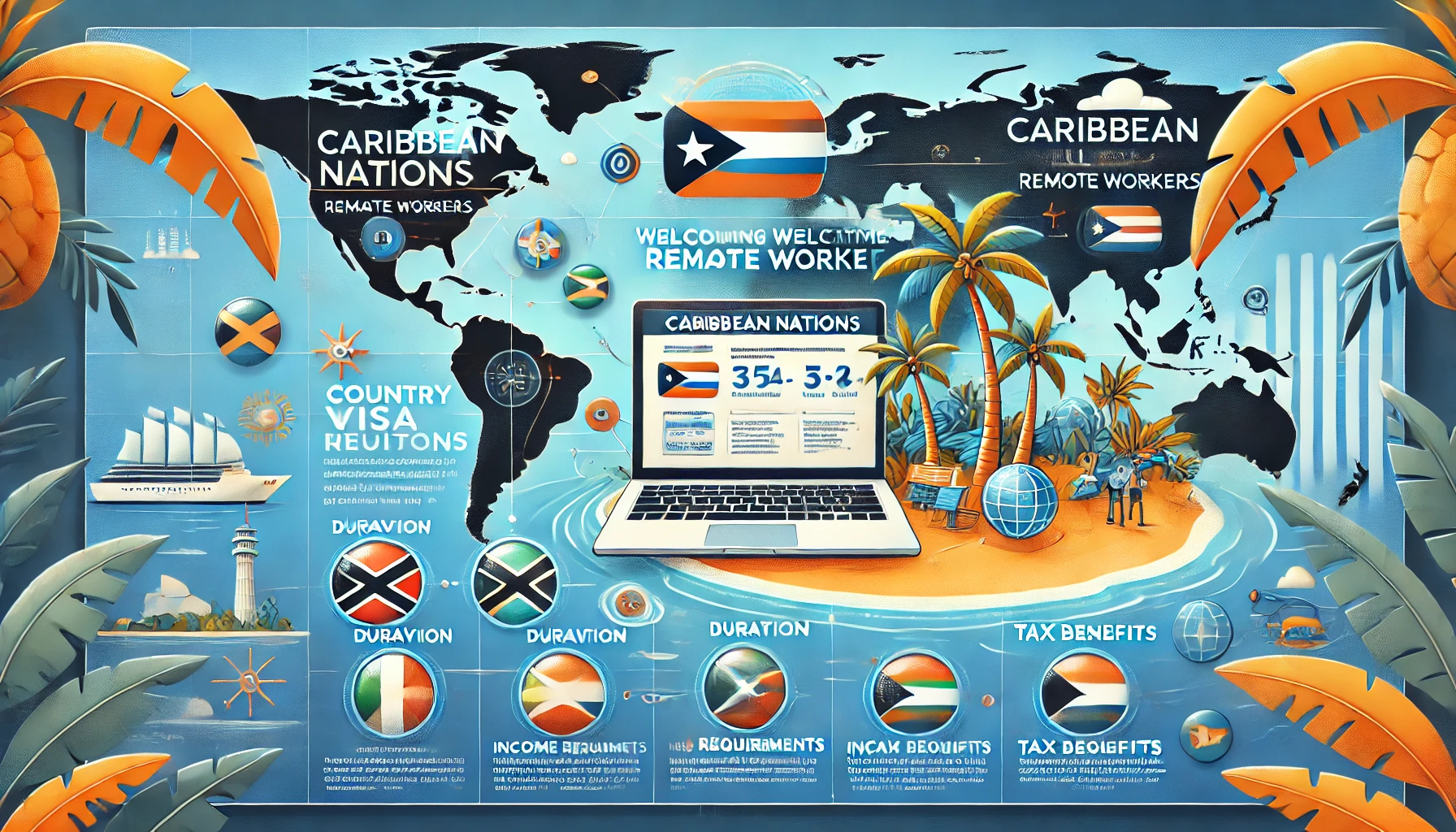
Barbados Welcome Stamp
The Barbados Welcome Stamp has quickly become one of the most popular digital nomad visas in the Caribbean. This program allows remote workers to live and work in Barbados for up to 12 months, with the possibility of extension.
Key features of the Barbados Welcome Stamp:
- Valid for 12 months
- No income tax in Barbados
- Application fee: $2,000 for individuals, $3,000 for families
- Minimum annual income requirement: $50,000
| Requirement | Details |
|---|---|
| Age | 18 years or older |
| Income | $50,000+ annually |
| Health Insurance | Mandatory |
| Application Process | Online |
Antigua and Barbuda’s Nomad Digital Residence
Antigua and Barbuda offer a compelling option for digital nomads seeking a Caribbean paradise. Their Nomad Digital Residence program provides a two-year visa for remote workers.
Key aspects of the Nomad Digital Residence:
- Valid for 2 years
- No local income tax
- Access to all 365 beaches in Antigua and Barbuda
- Application fee: $1,500 for single applicants, $2,000 for couples, $3,000 for families
Cayman Islands Global Citizen Concierge
The Cayman Islands’ Global Citizen Concierge program caters to high-earning professionals looking for a luxurious remote work experience. This program offers a two-year certificate for digital nomads.
Notable features:
- Valid for up to 2 years
- Minimum annual income requirement: $100,000 for individuals, $150,000 for couples, $180,000 for families
- Application fee: $1,469 per year
- Access to world-class beaches and a thriving expat community
Each of these Caribbean nations offers unique benefits for digital nomads, from pristine beaches to tax advantages. When considering these options, it’s essential to weigh factors such as cost of living, internet connectivity, and lifestyle preferences.
Asian Countries Offering Digital Nomad Visas
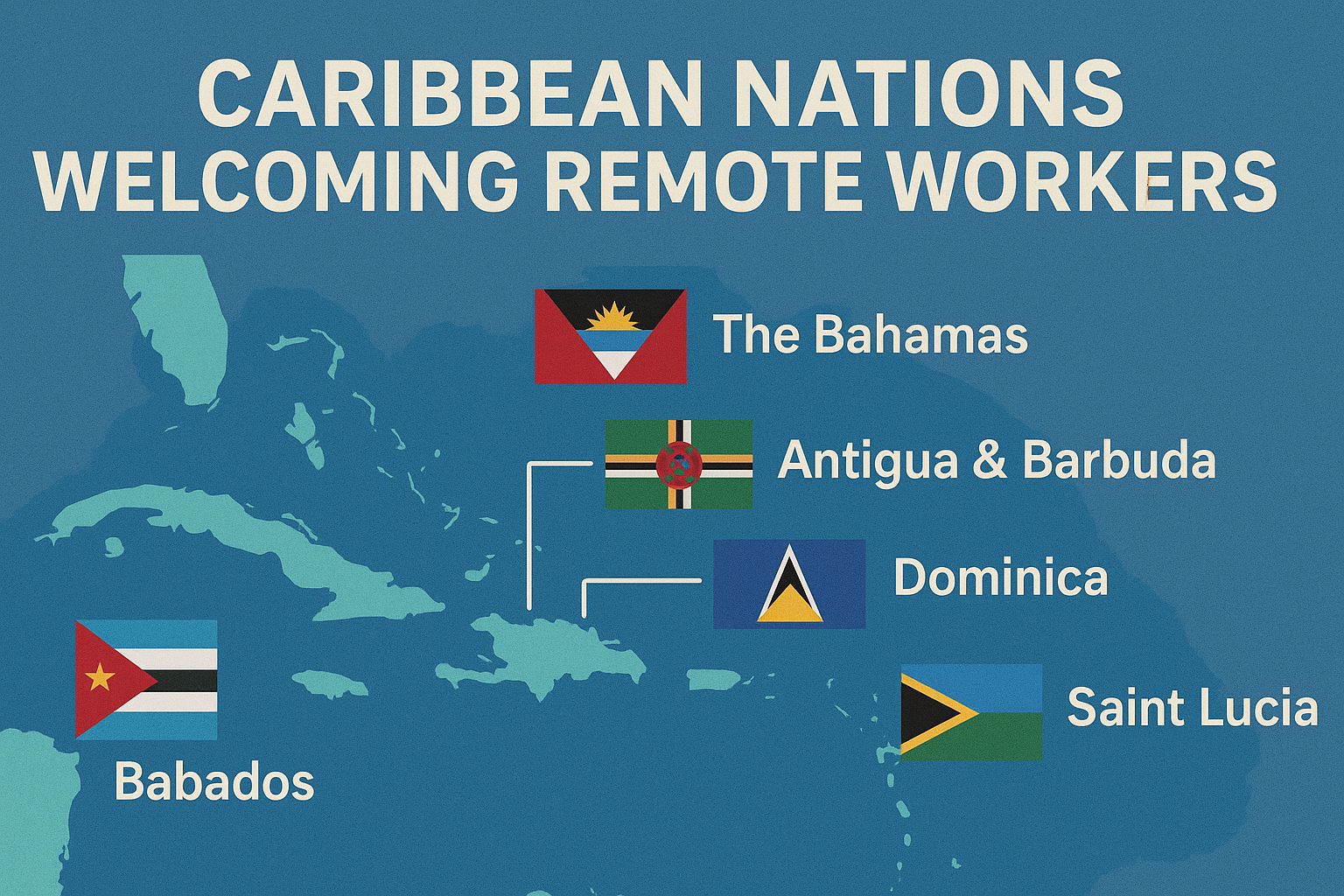
Thailand’s Smart Visa
Thailand’s Smart Visa program is designed to attract high-skilled professionals, including digital nomads, to contribute to the country’s economic development. This visa offers numerous benefits, including:
- Extended stay: Up to 4 years without renewal
- No work permit required
- Fast-track services at international airports
- 90-day reporting instead of the usual 90-day visa runs
To qualify for the Smart Visa, applicants must meet specific criteria:
| Criteria | Requirement |
|---|---|
| Income | Minimum $80,000/year |
| Experience | At least 5 years in relevant fields |
| Employer | Must be certified company in targeted industries |
Dubai’s Remote Work Visa
Dubai’s Remote Work Visa allows digital nomads to live and work in the city for up to one year. Key features include:
- Access to all UAE services, including banking and utilities
- Ability to rent accommodation and bring family members
- No income tax on overseas earnings
Requirements for the Dubai Remote Work Visa:
- Proof of employment from current employer
- Minimum salary of $5,000 per month
- Valid health insurance coverage in the UAE
Taiwan’s Employment Gold Card
Taiwan’s Employment Gold Card is a 4-in-1 card that combines work permit, residence visa, Alien Resident Certificate (ARC), and re-entry permit. Benefits include:
- Valid for 1-3 years with possibility of renewal
- Freedom to work for any employer or be self-employed
- Tax benefits for high-earning professionals
Indonesia’s Second Home Visa
Indonesia’s Second Home Visa, launched in 2022, allows digital nomads to stay for 5-10 years. Key features:
- Long-term stay without frequent visa runs
- Ability to conduct business activities
- No Indonesian tax on foreign-sourced income
To qualify, applicants must show proof of funds (approximately $130,000) in an Indonesian bank account.
Emerging Digital Nomad Destinations
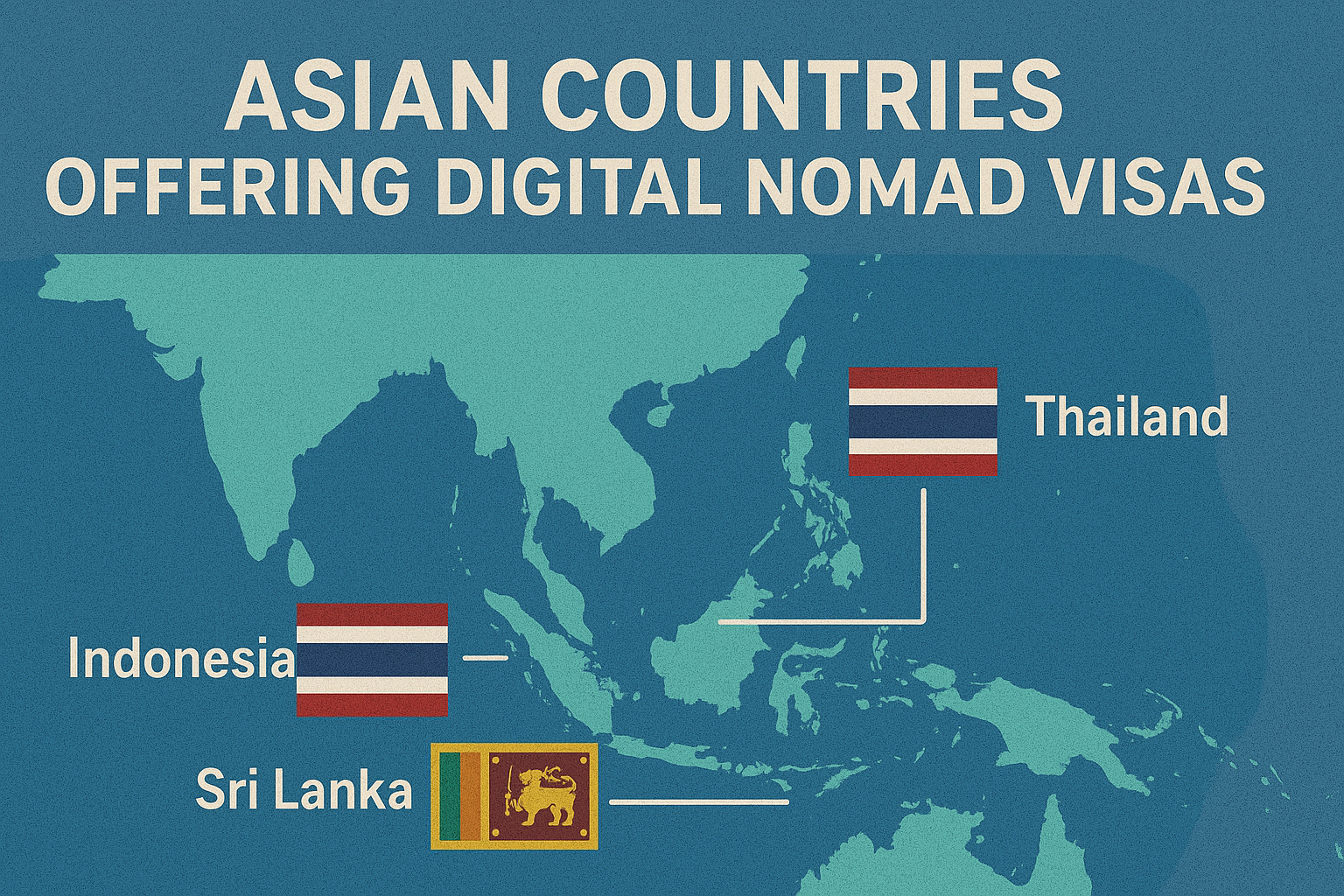
Costa Rica’s Rentista Visa
Costa Rica’s Rentista Visa has emerged as an attractive option for digital nomads seeking a longer-term stay in this tropical paradise. This visa allows foreigners to live in Costa Rica for up to two years, with the possibility of renewal.
Key Features:
- Duration: 2 years, renewable
- Income Requirement: Proof of $2,500 monthly income for 2 years
- Processing Time: 2-3 months
- Work Restrictions: Cannot work for Costa Rican companies
| Pros | Cons |
|---|---|
| Beautiful natural environment | Higher income requirement |
| Stable political climate | Lengthy processing time |
| Growing expat community | Limited local work opportunities |
Mexico’s Temporary Resident Visa
Mexico has become increasingly popular among digital nomads, offering a Temporary Resident Visa that caters to remote workers and freelancers.
Visa Details:
- Duration: 1-4 years
- Income Requirement: Approximately $2,100 monthly or $36,000 in savings
- Application Process: Must begin at a Mexican consulate outside Mexico
South Africa’s upcoming remote work visa
South Africa is set to join the ranks of digital nomad-friendly countries with its upcoming remote work visa. While details are still being finalized, this visa is expected to attract digital nomads to experience the country’s diverse landscapes and vibrant culture.
Anticipated Features:
- Duration: Likely 1 year, with possible extensions
- Target Audience: Remote workers and freelancers
- Potential Benefits: Access to world-class cities and natural wonders
As these emerging destinations continue to refine their visa offerings, digital nomads will have even more options for combining work and travel in exciting new locales.
Comparing Visa Requirements and Benefits

Length of stay
When comparing digital nomad visas, the length of stay is a crucial factor to consider. Different countries offer varying durations, typically ranging from 6 months to 2 years. Here’s a comparison of some popular destinations:
| Country | Visa Duration |
|---|---|
| Portugal | Up to 1 year |
| Estonia | Up to 1 year |
| Barbados | Up to 1 year |
| Costa Rica | Up to 2 years |
| Mexico | Up to 4 years |
Income requirements
Income requirements vary significantly between countries, reflecting local economic conditions and cost of living. Some common criteria include:
- Minimum monthly income
- Proof of savings
- Employment contract or steady freelance work
Tax implications
Tax considerations are vital when choosing a digital nomad visa. Key aspects to evaluate:
- Local tax obligations
- Double taxation agreements
- Tax-free periods
Healthcare provisions
Healthcare access can differ greatly among digital nomad visas. Consider:
- Mandatory health insurance requirements
- Access to public healthcare systems
- Quality of local medical facilities
Ease of application process
The complexity of visa applications can impact your decision. Factors to compare:
- Online vs. in-person applications
- Required documentation
- Processing times
- Application fees
By carefully comparing these aspects, you can select the digital nomad visa that best aligns with your needs and preferences. Next, we’ll explore some practical tips for choosing the right digital nomad visa for your unique situation.
Tips for Choosing the Right Digital Nomad Visa
![]()
Assessing your work style and needs
When selecting a digital nomad visa, it’s crucial to align your choice with your work style and professional requirements. Consider the following factors:
- Work hours and time zones
- Client communication needs
- Project deadlines and flexibility
| Work Style | Ideal Visa Characteristics |
|---|---|
| Flexible hours | Countries with relaxed work regulations |
| Fixed schedule | Destinations in compatible time zones |
| High-intensity | Places with reliable infrastructure |
| Client-facing | Locations with good international connectivity |
Considering cost of living
The cost of living can significantly impact your quality of life and savings potential. Key aspects to evaluate include:
- Accommodation expenses
- Food and dining costs
- Transportation fees
- Healthcare expenses
- Entertainment and leisure costs
Evaluating internet infrastructure
For digital nomads, reliable internet is non-negotiable. Research the following:
- Average internet speeds
- Availability of co-working spaces
- Reliability of mobile networks
- Public Wi-Fi accessibility
Exploring local culture and community
Immersing yourself in the local culture can enhance your digital nomad experience. Consider:
- Language barriers and learning opportunities
- Local customs and traditions
- Expat and digital nomad communities
- Networking and social events
By carefully weighing these factors, you’ll be better equipped to choose a digital nomad visa that suits your personal and professional needs. Remember, the ideal destination should not only facilitate your work but also enrich your overall life experience.
The world of digital nomadism continues to expand, with more countries recognizing the value of remote workers and offering specialized visas to attract them. From the sun-soaked beaches of the Caribbean to the bustling cities of Europe and the serene landscapes of Asia, digital nomads now have a wealth of options to choose from when deciding where to live and work.
As you embark on your digital nomad journey, carefully consider the visa requirements, cost of living, and lifestyle factors of each destination. Whether you’re drawn to the cultural richness of European cities, the laid-back island life of the Caribbean, or the technological hubs of Asia, there’s a perfect spot waiting for you. Take the time to research and compare your options, and don’t hesitate to reach out to fellow digital nomads for advice. Your next adventure as a global remote worker is just a visa application away!

